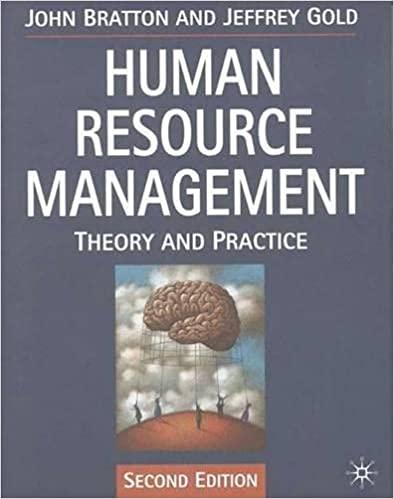Oil Tool Incorporated was established in West Yorkshire in 1950, and four years later became part of
Question:
Oil Tool Incorporated was established in West Yorkshire in 1950, and four years later became part of Oil Tool International, an American multinational company engaged in the design, manufacture, and marketing of machinery used at the well-head in drilling for the production of oil and gas, both onshore and offshore. The company, whose corporate headquarters are in Houston, Texas, USA, has other manufacturing establishments in Scotland, Germany, France, and Mexico, and employs 4500 people throughout the world.
Oil Tool Incorporated dominated the oil extraction industry for nearly forty years. After growth and continual profits things started to go wrong in 1985. Low productivity, rising production costs, a decline in oilfield exploration, and new competitors entering the industry, culminated in a £76 million loss for the West Yorkshire plant. At this point the senior management decided to bring in an outside consultancy firm, Mercury Engineers Inc.
Bill Dorfman, the plant manager, called a meeting with his senior management team and the consultants. Dorfman started the discussion. 'We all know that we have considerable autonomy from the corporate management in Texas. That means we have the task of turning this plant around. If we fail the plant will close. This is the company's biggest manufacturing operation in the world. But, it would only be a question of months before another operation could be bigger. Headquarters have moth-balled several of our operations and the French and German plants could be 'geared up' to our size within twelve months. What has gone wrong and how do we turn this plant around?', he asked.
Yvonne Turner, the marketing manager, began. 'Our sales have fallen in the Middle East because our customers want equipment that is lighter and more mobile. The design and the materials of our block-tree valve haven't changed for ten years.' She went on, 'The Japanese are engineering equipment that is made with alloy metals and is lighter, stronger and has a microprocessor-based control system.'
Doug Meyer, the manufacturing manager, jumped in. 'Don't blame us. If the market is changing out there, it's marketing's job to tell us and keep us informed. It's not just our manufacturing practices, we all know our prices are higher because of sterling's high exchange rate. And besides,' he said angrily, 'we lost that last Middle East order because the government refused to give us an export licence. Whether there is a war or not, if we don't sell them the machinery, you can be damn sure, somebody else will. We ought to get the local MP to have a word with the bureaucrats in the Board of Trade.'
At this point, Wendy Seely, the human resource manager, intervened in the discussion.
'Well, I don't know whether we can blame everything on the government in London. I do know, however, that EU Directives on pay equity and recent court decisions on retirement and pensions will push our labour costs up. We must find ways to reduce labour costs and improve quality standards,' she said. 'We can't achieve high quality standards,' retorted Doug Miller, 'because your department stopped training apprentices and we can't find the quality we need using sub-contractors.'
Feeling defensive, Wendy Seely argued, 'We ended the training programme for apprentices because the local college closed the first year apprentice course, as part of its own cost-saving measures. You can't blame my department for that.' Bill Dorfman decided to bring the meeting to a close. 'Would each department address the issues discussed this morning? We shall meet in seven days and see whether there is a consensus on the way forward. Remember we have to be competitive to survive. We have to quit whining and save this plant,' he said.
Step by Step Answer:

Human Resource Management Theory And Practice
ISBN: 9780333732083
2nd Edition
Authors: John Bratton, Jeffrey Gold





